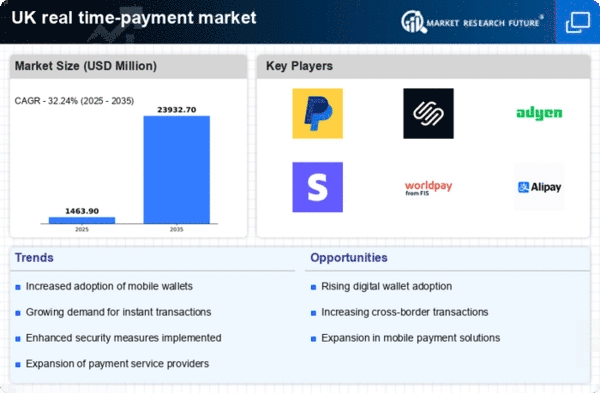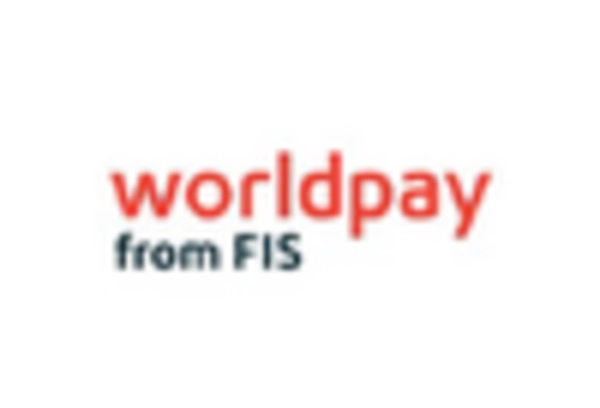Rise of Mobile Payment Solutions
The proliferation of smartphones has catalyzed the rise of mobile payment solutions, significantly impacting the real time-payment market in the UK. With an estimated 80% of the population owning a smartphone, mobile payments are becoming increasingly popular. This trend is further supported by the convenience and accessibility that mobile payment applications offer. Data suggests that mobile payment transactions have surged by over 40% in the past year, reflecting a growing preference for on-the-go payment options. The real time-payment market industry is adapting to this shift by developing user-friendly mobile applications that facilitate instant transactions. As mobile technology continues to evolve, it is anticipated that the market will expand, driven by the increasing adoption of mobile payment solutions.
Consumer Demand for Instant Transactions
Consumer expectations are evolving, with an increasing demand for instant transactions shaping the real time-payment market in the UK. As e-commerce continues to grow, consumers are seeking seamless payment experiences that do not involve delays. Recent surveys indicate that approximately 70% of consumers prefer payment methods that offer real-time processing. This shift in consumer behavior is prompting businesses to adopt real time-payment solutions to enhance customer satisfaction and retention. The real time-payment market industry is responding to this demand by providing innovative solutions that cater to the need for speed and convenience. As more businesses recognize the importance of meeting consumer expectations, the market is likely to witness significant growth in the coming years.
Technological Advancements in Payment Systems
The real time-payment market in the UK is experiencing a surge due to rapid technological advancements. Innovations such as blockchain and artificial intelligence are enhancing transaction security and efficiency. The integration of these technologies allows for instantaneous processing, which is crucial for consumer satisfaction. According to recent data, the adoption of contactless payments has increased by over 30% in the last year, indicating a shift towards more efficient payment methods. As consumers demand faster and more secure transactions, the real time-payment market industry is likely to expand further, driven by these technological improvements. Financial institutions are investing heavily in upgrading their systems to accommodate these advancements, which may lead to a more competitive landscape in the payment sector.
Increased Focus on Security and Fraud Prevention
Security concerns remain a critical factor influencing the real time-payment market in the UK. As digital transactions become more prevalent, the risk of fraud and cyber threats has escalated. In response, financial institutions are prioritizing security measures to protect consumers and businesses alike. Recent statistics indicate that fraud attempts in the payment sector have risen by 25% over the past year, prompting a stronger emphasis on security protocols. The real time-payment market industry is likely to see advancements in encryption technologies and biometric authentication methods as a means to enhance transaction security. This focus on security not only builds consumer trust but also encourages wider adoption of real time-payment solutions.
Regulatory Developments and Compliance Requirements
The regulatory landscape is evolving, with new compliance requirements impacting the real time-payment market in the UK. Regulatory bodies are increasingly focusing on ensuring consumer protection and promoting fair competition within the payment sector. Recent regulations have introduced measures aimed at enhancing transparency and accountability in payment processing. As businesses navigate these regulatory changes, the real time-payment market industry is likely to experience shifts in operational practices. Compliance with these regulations may require significant investment in technology and training, but it also presents an opportunity for businesses to differentiate themselves through enhanced service offerings. The ongoing regulatory developments are expected to shape the future of the market, influencing how payment solutions are designed and implemented.
















